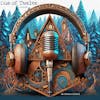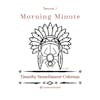

Join me for this episode of The Colors of Sound podcast, where I interview the multi-talented Alcy Leyva, for his book: “The silent, subtle, ever-present perils of life”. This audio was taken from our Live-Streamed event that took place on Thursday, October 19, 2023, in Manhattan, New York City.

Season 2, Episode 2: The Alcy Leyva Interview
Join me for this episode of The Colors of Sound podcast, where I interview the multi-talented Alcy Leyva, for his book: “The silent, subtle, ever-present perils of life”. This audio was taken from our Live-Streamed event that took place on Thursday, October 19, 2023, in Manhattan, New York City.
Synopsis of the Book:
In the silent, subtle, ever-present perils of life, we meet Imajin (his friends and family call him Maji), a sixteen-year-old African-American boy from the Bronx who, during one fateful summer, finds his world crumbling down around him. During his last class of the school year, he feels overwhelmed by the news of a young Internet celebrity taking his life in Brooklyn and another of a pregnant black woman held at gunpoint by cops. This is the same day that his favorite teacher and role model announces that he's leaving the school before Maji's senior year. Couple this with him internally dealing with the destruction of his family — his mother suffering from depression and his father slowly pulling away from his home — and Maji decides to run. Run from everything. Run from everyone. Building a small raft out of materials from his neighborhood, and with nothing but the Moby Dick book he stole from his teacher and a few printed maps, Maji sets sail down the Hudson River one night and out to the open sea hoping to find a miracle that would make his life special and worthwhile.
#TakeBackMonday, #Purpose, #Service, #Community, #People, #InnerCircle, #QuoteOfTheDay, #community-service, #bronx, #smallbusiness, #newyork, #black, #positivevibes, #learning, #workshop, #intergenerational, #podcasting, #LiveBrave, #intergenerationalprogramming, #technology, #LifeLearner, #ColemanGlobal, #author, #writer, #book, #amazon
--- Send in a voice message: https://podcasters.spotify.com/pod/show/colemanglobal/message Support this podcast: https://podcasters.spotify.com/pod/show/colemanglobal/support
In a world where so many things are vying for your time, I just wanted to say, Thank You for your attention.
In Unity,
Timothy
Welcome, everyone. Thanks for coming and joining us this evening. My name is Timothy Stonedancer Coleman. I am the founder and CEO of Coleman Global. We put out a podcast called The Colors of Sound. Our mission is to create a safe space for people to share their stories. We have interviewed people from all walks of life.
We released our first episode just a couple of weeks ago. We're in season two. I've had a chance to meet folks from, it's amazing when you give someone a chance to speak about what's important to them and where they come from and to share their stories. You learn so much about what we all have in common and that's our catchphrase.
Discover what we all have in common. Today, we have an amazing gentleman with us, Mr. Alci Leyva, who wrote our book of the evening, The Silent, Subtle, Ever Present Perils of Life. Alci is an accomplished author who has multiple books that we're going to get into. He'll share a little bit about that with us throughout the evening.
I was born and [00:01:00] raised in Nebraska. I've been living in New York for 24 years. Since the age of 19, but I've been in the Bronx for 24 years. I wish I was that young. And you know, this is home, right? And so I always am looking forward to sharing stories, especially about the Bronx, because I feel like everybody else is always trying to tell our story.
And usually when you look at television, that story is depressing. And we don't really highlight enough of the genius and the potential and the power that we all have in the Bronx. You know, I know we're sitting in this amazing store. in Manhattan, but I'm still going to rep the Bronx. I don't care where we go.
, we going to pretend like we're uptown right now. , I want to say one quick thing about this location is that they also have vinyl records over here on the side. Sorry, I already had a chance to pick some favorites and put them away, but, , you should definitely check that. And it triggered for me why I also created this particular podcast, because my father used to be a [00:02:00] gospel radio DJ for like 30 years.
And I remember tagging along with him and dragging crates of vinyl records. So it was just kind of cool that this moment is kind of like a full life cycle, , moment. So, let's get into it. The Silent, Subtle, Ever Present Perils of Life is a book that's been released by Greenwriters Press, a woman owned, Vermont based global publisher.
The term locovoir applies to their mission, which is to publish books, e books, and audio books that will spread a message of hope and renewal as they strive to build awareness about the global climate catastrophe. In the silent, subtle, ever present perils of life, we meet Maji, a 16 year old African American teenager from the Bronx who, inspired by Moby Dick and overwhelmed by issues of racism, mental health, and complex family dynamics, sets sail on the Hudson in search of a miracle and experiences [00:03:00] a coming of age journey that blends , that blends own voice insight, social commentary, elements of magical realism.
Alci Leyva is a Bronx born, multi genre writer whose first two books in the Shades of Hell series, And Then There Were Crows, And Then There Were Dragons, were published by Blackspot Books. Alci is currently working on his PhD in creative writing for the University of Bingham, where he lives and works, while he lives and works, I'm like, how'd you pick that up?
, while he lives and works in New York. Please, can we give a round of applause for our guest, Alcee Leyva. Thank you.
I'm going to try not to have my white woman voice on the podcast. Thank you for having me. I've never been on a podcast, so I'm going to try to be real, so. How you doing? Come on, Bronx. How you doing? This is why they keep writing our story in a different way. Exactly. All right, [00:04:00] so tell us a little bit about your background, like, you know, where are you from, what area of the Bronx are you from, where you grew up.
And what does the Bronx mean to you? Sure. So I was born in the South Bronx. And that's like the East Tremont area. I was born and raised there. Like Fordham Road, all the way down to the Bronx Zoo. That's like my area. That's where all my memories are. And so, You know, I grew up walking through those streets and I went through school there, I went to Catholic school in Fordham Road, I went to Catholic school, I went to a lot of Catholic school, , Catholic school in, in, , Cardinal Hayes High School, so, it's one of those things that I had the opportunity to live in and then eventually when I grew up, I got, I had the opportunity to teach there, so, that's like, that's my journey with many more little people.
Wrinkles in there. We all have those wrinkles. , so we know that you're a writer. Obviously, we're here to celebrate the release of your book. Which [00:05:00] book, what number is this? How many books have you released? So I've released two books, , out of a series. So it was called the, the, Hell series.
And the third book is still in limbo, literally, that I'm still trying to put out and publish. I've been part of two other, anthologies, collective stories, and then this is my first, , young adult fiction book, so, this is technically my third book by myself, but it's like my fifth book out to publish.
And how did you land on being a writer? Like, did, you know, sometimes we arrive in places in life, and it's because we've done like all these other things, and then all of a sudden... You know, something ignites inside of us and we get on a path of purpose, you know So did you always write when like even when you were younger or is this something that?
Sparked out of something else that you were doing. I wrote quite a bit It was all weird and offensive and It's just [00:06:00] something that's innate Right. I, you know, my father passed away, just a year ago, over a year ago. And one of the things that I found was he was like, you know, the storyteller himself.
So I think there is, , part of it in my blood, to say that. , but I've always been interested in stories. I think the subjects that I didn't fail at, , I look at as stories. So history, I really love because I look at as stories, science as well. Not math, but, and English. Like these are these, the subjects that I really connect myself to is like philosophy as well.
I love and religion. I love as well, like studying that I see it as stories. Because in the end, you know, we have this discussion of like, what's the role of the artist, you know, the painter, the poet, the writer. And usually we have the historians and the scientists that build things, but the artists are the ones that kind of tell you the emotional background of it.
So I'm always [00:07:00] fascinated by just storytelling. In all kind of like backgrounds and disciplines. Right. Because it kind of overlaps with like, Does life imitate art or does art imitate life? Right? Do you have an answer for that? I'm not here for that conversation. I just worked a full day of school. I'm not here for existentialism.
Alright, an easier question. What are some of your hobbies? Well... ... My hobbies include softball, so I play a lot of softball, and teaching, and thinking about teaching, and thinking about writing. I think everything goes together, right? I, My hobbies, and if you want to talk like activities that I love to do, I love hanging out with my sons, I love hanging out with my family, but, , yeah, it's all unfortunately, , even when I'm doing those, I'm writing, right?
So like sometimes my wife is driving next to me and I'm just driving on the highway and it's all dark and I'm [00:08:00] like, email me something. A dog speaks to its owner. With a loaded gun. Write that down, email that to me. And then like, ten months later, I look at my email and I'm like, What the hell is this? A dog?
So even in my hobbies, I'm still writing. It's still part of my process. Because a lot of the writing that I do, like, my original genre is speculative fiction. All of us know what speculative fiction is. Absolutely not. Nope. , so speculative fiction is fantasy that specifically takes place in city dwellings, right?
So, it's like taking a city and filling it with... Magic with dragons with demons and the reason why I love it is because New York City is just my city that I Love and adore so I love telling its stories, but I love telling it through lenses and stuff like that. So I can't escape that so whenever I'm on the train or I'm driving around I'm always thinking of [00:09:00] Things people say to each other or weird things that happen or what is that smell?
So it's part of my you know, it's I'm always kind of writing. Yeah, I have that What is that smell? You know that I spent several years on the 41 bus, you know, and you know They laugh at me because I used to work for the Department of Education and on my way home every day I would put my headphones on and I would just listen to the sounds of the Amazon You know, just so I could calm back down from working in such a chaotic kind of situation and then you know You can't imagine what it's like to hear like waterfalls and parakeets and all these other types of things while you're looking at all these People on this insane bus ride.
Yeah, the smells don't match. It's a nightmare So you mentioned before, you know a little bit about family How important is family to you? Extremely I think my Connection to family. I mean, I'm always rooted in relationships Right. And, when I first [00:10:00] started writing, I started thinking about my relationships.
So my relationships to my mother and my father, my brothers, and my sons. Right. That's always, I'm always fascinated by that. The people who lift us up, the people who pick us up when we're down, and how that is not always the case. Right. Right. And I am grateful. To have an amazing family that supports me.
My mom is here, sitting right there. So I'm gonna highlight her right there. Fabulous hair. And I'm also gonna give her this.
Oh, how beautiful. Flowers, that's nice. That's really cool. For her support. , and, you know, , I was someone that, , really lucked out with a, an amazing family. So, I'm respecting and understanding that time, yeah. That's beautiful. That's beautiful. So, are you a writer full time? You mentioned that you [00:11:00] teach.
Like, what is, you know, is this the side hustle till it becomes the main hustle? Like, how are you fitting, you know, this being like the fifth? piece that you've entered into the world, right? Three books by yourself plus the other ones that you've been a part of. How are you? Four year pregnancy. That was very bad.
This one? Yes. It took four years, four years. Well, what sparked it? Like what? So to answer your question, those actually, those two questions go together. I always approach everything from the writer's perspective, right? So Even in my, you know, group of, you know, people that I work with, the other teachers, my background is specifically writing, not education.
So I do love to teach, but I always look at it as a lens of, like, what do authors do? Right? What, how do they see the world? And so on. And my background, and as I said, my, it's not education, I got my master's from, in fiction in 2016 from the New School. And I [00:12:00] read Moby Dick. Don't ever read it, it's a terrible book.
, and I'll explain why probably later. And yet, one of your characters is Yes. Okay. Yes. Alright, we'll get to it. We'll get to it. , but I wrote two things then. I wrote the first sentence of this book. And then I wrote another thing, because I just chase as many cars as I can. I wrote another thing, which was Moby Dick from the perspective of the whale.
Like, I literally wrote a book about him. And, , I was just fascinated by it. Like, I was, it's just there all the time. So I always knew that I wanted to represent it. There's this study that talks about like how we're different learners. The way I learn something is I... I mimic it, right? So I, if I really love a writer, I try to write like that writer.
I write down sentences, the way they construct their sentences. So for like a whole year, I was writing like Melville, which was awful because, again, don't read [00:13:00] Moby Dick, it's really awful, but it's on purpose, right, there's a purpose to what Melville does in that book, , but I like to mimic, and once I get into the mimicry I understand and try to like get into the meat and bones of it, but that's always my approach is, It's like learning and then putting down, but I only wrote the first sentence like four years ago and then I put it down for a while.
So what made you pick it back up? I mean, if you've done, you know, you've gone in these different pathways. It's four years, it's in a text, next to, you know, another text about a dog with a gun. Like, what made you pull this back? I might have, I should have gone with the dog. It's not too late. It's , the pandemic.
I mean, I was... I was locked away, and we were all locked away in our little boxes for so long. But the pandemic triggered so many things at the same time, right? While everyone was in their little boxes, we still had like this [00:14:00] explosion of like, Black Lives Matter, and... Me Too movement, and there was such a big push, for social justice and civil rights and everything that was happening there.
This new resurrection, because no one can turn away from their phones. That's the only way we can communicate. So... I was fascinated by it because I had, when I first wrote that sentence in 2016, I saw Maji. So, , let me explain how I think about writing. I think writing is like, I think writers are cursed.
Right? Because we see kind of like a door. And sometimes that door is wide open. And you can look right through that door and you can see everything. You can see the trees, you can see the water, you can feel the air. But that sometimes that door is shut and you can only look through a little peephole and that's all you can see.
And you can't control when the door is open and when it's closed. In [00:15:00] 2016, the door was closed, but I can see through the peephole Maji, right? I can see him on the raft. I can see him listening to music. I didn't know why he was on the raft. I didn't know what music he was listening to. I don't know what put him out there.
So I just put it off to the side and then, in the pandemic, when I sat down to start writing, I saw everything that door was open. And I, that's, this is probably like, when I say it took me four years to write, that's a lot, , that's pretty far, right? Six years away from when I first wrote that sentence.
But it only took me about four months to write. Like, cover to cover. Do you feel like that's because you were so focused and intent in that specific wave of creation that it just that was it's time to be born? Yeah, and I had to write experience things. So this book... While it is, you know, YA fiction, I like to think of it in two, like, two parts.
First for young adults, this is definitely a book [00:16:00] that they can pick up and understand and relate to and see. But for adults I wrote it as myth, you know? And your question about, like, where does, you know, Where you, where are you from the Bronx? One of the things that I learned very early was that other people were telling our stories, right?
Right? And so This is me kind of reclaiming it, you know, because I knew that No one read who here has read Moby Dick. Don't lie. Thank you. We don't have to lie to ourselves We don't have to lie and I can tell you that's not a thing that Bronx students read, you know?
Specifically because one, it's very big old book, but two, it seems outside of us. It's about a white guy that goes out to the ocean and bugs out with a whale and bugs out with a whale and to us that's not part of our world, so we separate it, but [00:17:00] the lesson in there is ours. You know, the lesson of, like, obsession and, you know, , man, you know, man versus nature and questioning existence and questioning God, I didn't set out to, like, rewrite what Melville did.
What I did was I extracted all the themes that he saw and I put it in this book. And that's why when I saw Maji on the boat, I knew exactly what it was because Maji is, like, An amalgamation of everything I've seen teaching, you know, if you read a story and you're like, wow, that's a lot of detail, that's because it happened, you know, Maji is many students that I've read, that I've had in my classes and so that's how I was able to see him because I've seen him in front of me, you know, and so the structure of the book is very much like, A fable for [00:18:00] adults.
A myth for adults. It's separated into three different sections. And, but if you look at the construct, right, I built a fictional Bronx called, Park South. But if you look at the construct, it's Bronx Park South. It's where I grew up, right? So the buildings are still where they are, the people are still where they are.
But is that intentional? You know what I'm saying? Like, do you sometimes like get in the creative zone and you're going for it and then when you go back to read it, you realize, Oh my God, I've experienced some of these same thing. Like are you How conscious are you inside of the wave of creation? Yeah, so there's two ways to go about it There's one way where you can step back and be like, well, i'm just going to like create a world from my imagination but some of the greatest writers Don't need that.
You know, Marquez who wrote A Thousand Years of Solitude rewrote his country's history, right? And it was just it's a foundation and so that's what I wanted to do I did it intentionally [00:19:00] to be like these stories still exist like These themes still exist in the Bronx and we shouldn't get rid of it You know, and of course, it seems like, it's not entirely, you know, what Melville was intending, but it definitely has all of the themes, that he was like, touching on, and I see it in today's youth, right, so.
A lot of the things with, it seems weird, but why do I exist? 16 year olds in the Bronx ask themselves that question. Who do I look up to? What, who do I mirror? Who's my mirror? And especially with, you know, kids who are, you know, , Hispanic and black. It's hard, it's impossible to see themselves in Shakespeare.
It's impossible to see themselves in places in literature. And that's why when I teach, I'm like, We're not, I'm not teaching you dead white men. We're gonna go, we're gonna, we're gonna really take the expanse of literature. Because there's more stories than just... [00:20:00] That's right. That's absolutely true.
So how important is it to you that kids have a representation of themselves even in the classroom? Right? Like even the person introducing a story to these students can shade that story based off of their own lens. Yeah. Right. So, so what are your thoughts about students being able to see a representation of themselves in these types of positions?
It's. It's highly important. I mean, I'm an English teacher. And it's very, it's not rare, but it's not often that you see a male Hispanic English teacher. And so I've had many students that are just like, so how do we, how do I connect to you? Cause I want to connect with you. Like they see it and I see it in them too.
I see myself, working on that and their parents do too. I mean, I've had parents that come up to me and then. You know, I teach currently at the United Nations international school, [00:21:00] where there's just a lot of mix of students, but even in my classes, there are not many students of color, right, because it's a large, broad group.
ban there, but I do have students that are, that, you know, that their parents will come in and be like, as soon as they see me, they're like, I'm so glad, you know, I've had one parent last year was like, I'm so glad, that you're teaching my son because you know what kinky hair looks like, right, right, you know, and she's like, Don't be afraid to smack him.
I'm not getting anyone from, you know, Uruguay or Europe telling me that I can smack their child. But it's just like that community because it's even for parents of color that are raising kids such as Maji that have the same fears because Maji's father in this book, Eli, is like extremely afraid, right?
And there's fear that goes around. What does it mean to be survive, surviving in this city? So even for [00:22:00] parents, it's actually extremely important to have representation in classroom. Well, I mean, and what is the reality for so many students of surviving versus living? Yeah. Right? Like I feel that's a truth that is universal around the world, but specifically in the Bronx since we were talking about it.
A lot of these kids don't recognize, like, there's such a differentiation. Like, you know, we become so programmed of struggling and surviving that when they see someone on television that's, like, seven houses and multiple cars and traveling around the world whenever they feel like, like, that's just like a foreign character to them.
Right? And so we need folks who can actually bring that kind of stuff home to them and show them the pathway to it. So before we get into reading a passage from the book, I want to ask you what, how do you define purpose? And do you feel like as a writer you're living your purpose or is that just a piece of it?[00:23:00]
More existential questions, but I mean, but you know, I love it. No, I love it. I love it. Purpose. I mean, I'm someone that, you know, I failed at college so badly, badly. And, , it, it was specifically because I was seeking a purpose that wasn't mine. You know, I was a business marketing major. I was a business management major.
Don't even ask me what business management does. It just includes debt. That's what I probably did. . But once I locked into being an English teacher, that was my purpose. And I still remember, you know, in high school, in my junior year, I had a teacher in Cardinal Hayes, Mr. Slater. Who was like, you know, you scored so high in the Regents, you should be an English teacher.
And I was just like, get out of my face. You know, like, don't insult me like that, be a teacher. But I, but the thing is, I love sharing information with people. I love sharing stories with people. So. I'm [00:24:00] absolutely in my purpose, I feel like it's never a hundred percent, you know, I feel like you're slowly striving to that single, that singularity, that smallest point, the purest form, and I think I'm getting there, like I said, and I've said this before, I think this book is my favorite book, it is my favorite book, that I've written, and it's only because it's getting closer to what I want to do.
I love my other books. I really do. That's powerful. That's dope. Yeah, but it's inching towards that singularity. Yeah. Purity. I love that answer. So let's get into it. Give us some of these words, brother. Sure. So I'm going to read something because I've totally planned this.
Okay.
So I'm going to read the last part of the prologue. Majia's going out into the water. And he sees this apparition in the water, [00:25:00] which is like of a screaming woman. , I have a horror background. I don't know if you know that, , so like things that come up that are like, Ooh, that imagery is kind of spooky.
It's on purpose. But again, I actually talk about later on in the book where that image comes from. And yeah, this book does have to do with mental health as well. Because Maji is, it deals with anxiety and deals with like, you know, these things that he can't, necessarily like speak of because in communities of color it's hard to talk about mental health.
That's right. So he does, he sees this image but at the same time he's gonna see his first sunrise. So I'm just gonna read a little bit about this. But then his mind bends skipping back across his memory to the sound of splashing water. Out in the darkness, he sees the image of a pregnant woman holding her hands to her chest.
There's nothing around her, but Maji can feel his terror as if it's strangling him. There's another ghostly image just a few feet in front of her. A gun. A white [00:26:00] hand. She opens her mouth to yell. Before the gun fires, Maji feels the air change and turns to face the horizon. The water grows quiet. The sky appears to bruise.
This is it, Maji tells himself. It is here, already, the miracle. A red eye creeps out of the water in the distance and swells. Its vast light changes the entire sky. No, it's not an eye, but Maji knows it is beautiful. He doesn't blink. Instead, he stands to his feet and watches, mouth open. The clouds bend towards the sun as the new day is born.
Maji looks over to where the screaming woman had appeared, but she's escaped with the darkness. Pulling his earbuds from his pocket, Maji plugs himself into his phone and slips them in. He plays the first song on the playlist. As if fate, the first song that plays is Frank Ocean. Maybe it's fate, but he sings along.
And then it gets to the part where Frank sings, And the water is exactly what I wanted it to be. It's everything I [00:27:00] thought it would be. But this neighborhood is getting trippier every day. This neighborhood is going apeshit crazy. Maji laughs out loud and catches himself when he realizes That he's been crying this entire time.
He has never known the world to be so warm and beautiful. And in this new life revealing himself, itself to him, he finds himself ready to find his miracle. Thank you. So that is, , a major component too. I compose an entire playlist. So I usually make playlists, like music playlists, for all the books that I read, , I write.
But this is the first time I actually get to make one for a character. So the same music that he listens to on the boat is the same music that you can listen to. Cause I thought about what, you know, we always ask that question. What are the 10 songs that you have to take to a, you know, remote island that you can only take for yourself, you know?
And so, I made the playlist based on that. Like Maji's... He made a playlist that he knows [00:28:00] he's gonna lose reception, but he gets to download these only 12 songs, and listen to it on his journey. So that's where they're from. Were these songs playing in your head as you were writing it, or was it something that you went back?
In, you know, into the story and inserted them, like, were you feeling them? As I was writing it, yep. As I was writing it. And, there's like, you know, there's another character that comes in that sort of introduces, , other songs, and challenges Maji's songs and stuff like that. But, it's definitely one that just, it carries me through.
And that's why I like the first song is Frank Ocean, which is the prologue. But the last song is also Frank Ocean, which is like leaving, no spoilers, but leaving. So it's, , it's definitely the first time that I've created just a playlist for one specific character. That's really cool. Now talk to us about the cover.
How did this is so beautiful. Like how did this come about? Yeah. And did you, and is this actually what you had in mind, like as you envisioned him? In this raft, in the [00:29:00] water, like, what were the images that, that you had and how close is this? So, the beautiful people at Greenwriters Press, they, you know, when we were, like, getting going and getting this book done, were trying to figure out, okay, who would you like, you know, to draw up your cover.
, and I was just like, well, I don't know. And the first thing that was thrown out by Didi, who is, you know, you just mentioned her, she's part, she's the head, the figurehead of Greenwriters, she's just like, well, what about Kehinde Wiley? And I was just like, I teach, you know, I teach this man's art, in my class.
Like, he does a lot of portrait, and his most famous work, his most famous work is, The self portrait, the portrait of Obama that's up in the White House. So, that was like two weeks after he released that. And they were like, yeah, let's, how about Kehinde? And I was just like, sure. Go ahead.
Try it out. Try it out. And then like a week later, they were like, [00:30:00] Canda loves the idea of the book, you got the painting. That's nice. And they sent me this painting. , and now, this painting is amazing. And if you want to look at the entirety of the painting, this is one whole painting this way. , on the front and on the front and the back.
And, this one is actually hanging up in a museum in Washington. And when I first saw it I was just like, Yeah. And again I do think thinking of that, what I was telling you about the door, I feel like artists sometimes see the same thing from different perspectives. So when I saw that, I saw Maji and I mean, even in the background this entire painting is specific, is specifically about.
, boys fishing, surviving off the ocean. And there's like these ghostly things in the background. I was gonna say, it's like a haunting little scene, like, that's kind of faded out. Yeah, but at the same time, like, when I saw this, I also saw, like, a city in the background. Like, like, sailing away from New York City.
And I was just like, [00:31:00] holy crap, you know? So, I, I'm, like, super grateful to be able to say, like, this is... You know, this has his blessing as like, no, this is a painting that he created. But he wants to attach it to the work that I have. And I think that's it. You know, I think sometimes it takes.
Several artists together to put something together. And I couldn't have done, like I literally couldn't have done it. This has been my wallpaper of my phone, for the last two years. Because I, it just keeps reminding me of Maji. I see it and I think of him. So it's, Kehinde made his own Maji and I made my own Maji.
We were seeing the same kid. That's dope. Yeah, I have the logo of this The Colors of Sound podcast on my phone, like I stared at it forever And I changed it a thousand times and I was happy with it I thought initially I put it on cups I put it on all these things and I looked at the original one one day and I was like, I don't like it You know and I had to come back and like redo it.
So just like I think in writing, [00:32:00] in any type of artistry, you know, we have to get the idea out. Like I think that's one of the big things that, , I like to talk to the community about in that the biggest challenge is just taking step one, right? And it doesn't mean that it has to be perfect.
It doesn't mean that you have to be in love with that idea or be so attached to it that you can't see the possibility of it changing or growing, , or becoming something bigger than your original. , idea. But I think in writing we call that kill your darlings. Yeah. So you have something that is your darling project that you don't want to sometimes gotta kill it.
But make it better. Right. You know, like it's something that I see and I've grown, but that when you grow it should be growing with you. So That's dope. So that's funny because it triggers me to say. How do you know when you're done? Like, are you ever, like, how do you know when you've typed that final chapter?
Like, and, you hit the thing, and you sit back, and you're like, hello millionaire. You know, like, what, like, how do you know when you get to that point? You, , [00:33:00] I'll let you know when I get there. I, someone told me this a long time ago. I think this is from my master program. I don't know who said it.
So if someone remembers it, I evoke your name, summon you. But I think, , what I learned back then, it was like, great art is never finished, it's only abandoned, right? So it's like, it's, it becomes a vessel for someone else. So, someone such as, you know, da Vinci will paint something, and it won't be a hundred percent what he wants to say, maybe but it'll inspire the next person to finish that story and then we pass it on and pass it on. So the idea of like finishing is impossible for me personally, I just give it to my editor and I'm like, I don't wanna see it. I don't wanna see it, I don't wanna see it, I don't wanna see it, I don't wanna see
But I, . I can always go back and make it better because I'm always seeing something new. It just takes that time to step away, and that's when you have a team, right? That's why you have editors, and that's why you have people, that'll talk you off that ledge. And be like, stop [00:34:00] writing, stop editing.
But the people at Greenwriters Press have been just amazing with... You know, my, is it a period or a comma? Is it a period or a comma? So one day Madonna's gonna write a third verse to Like a Virgin. I'm sorry, my I'm just If I'm not existential, I can't even say it, then I gotta be like, me, you know what I'm saying?
Yeah, that's cool. I get it. Alright. So, what comes next, right? You say that this, , The baby of this, right, was birthed, the seed of this was birthed, you know, years back and then you've done other things and released other things and then now you've come back to this and you've put this out into the world, and it is an amazing book, I kid, like once I started reading it I was like yeah, so, what comes next?
Are you already working on your next project? Are you I hear what you said before about like, you're always riding and things are always inspiring you, but like, how [00:35:00] inspired are you into an actual process? I am, I have, I chased, like I said, I chased too many cars. So I do have like a collection of short stories that I'm working on, that I've been working on slowly.
And this is also coming from the pandemic, but this is more like. How do we try to reconnect after being disconnected for so long? So it's just short stories based on that. That's way, that's for adults for that one for sure. But then I also, I'm also in this PhD program and the outcome of that will be a book as well.
So that is once again, like rooting itself in Bronx history. So I'm learning a lot about Bronx history. learning more about every single, you know, element of the Bronx, all the way from the 1960s, all the way to till now to make another book, not a Maji, but, another exploration of the Bronx. So that's going to be my next.
I feel like my short stories is going to be my fun book, where I get to curse and [00:36:00] rant and kill as much as I want. But, , cause you need that sort of exorcism every single time. But, but the next, at the end of this, I'll definitely be, publishing something that is once again rooted in the Bronx.
Cause like I said I really loved, writing everything I did, but this is. I think this is my groove, and so I want to make the next book better and see where I can go with it. That's beautiful. Do you guys have any questions for Alci? I mean, I know I'm kind of hogging the question moment, so does anybody else have anything that they are interested in?
Whether it's about the book or his background, where he is in life. They've been so attentive, right? They've been attentive. But when you pop that question back on him, it's like, ... I don't see you. You don't see me. Yeah. Welcome to being a teacher.
So, all right, we're going to, we're going to give, Oh, yes, ma'am.
It almost sounds like a method actor, right? Like maybe you'll kind of mimic their style for a little [00:37:00] bit. At what point do you say like, okay, I've done enough mimicking and like, how do I take pieces of this and create my own narrative and put it in my own voice? Like, what does that transition moment look like?
Do you have a light bulb moment or is it just kind of one day?
And I'm like, and you're like, all right, I think it's time is, it varies. I stayed with Melville for so long. , but then my other books, which are the Shades of Hell series. That's me mimicking Dante's Inferno, right? So that was very easy because I love Dante's Inferno and I love Paradis. I know what my, I know what my niche is.
I know my voices and it's always sarcastic. And, , you know, temperamental, and, you know, Looking at the, his family's face? I think they can confirm. Confirm it.[00:38:00] So that will never change, right? So, like I said, like, I, I love I loved the concept of Moby Dick, but I wanted to see what would happen if I turned it over.
So my voice is, while it's Melville's pattern of words, and again, Melville will write two and a half pages with only semicolons and no periods. So, good luck reading that if you want to. But on the other end yeah. And then, but, I would love I mimic that, but in, Focusing on the things that I wanted to focus on, I always love thinking about identity and mental health and connections and reconnections and disconnections.
So it's always in the pattern or the structure of the author, but it's always with the things I care about. And then eventually that when I pull out, that's when I start, storyboarding, right? So when I storyboard is like, I take out these index cards, and I storyboard the entire story out.
And then I look at where the balance is, so am I following the pattern? [00:39:00] Do I have enough of my voice in every single chapter? It's color coded, it's nuts. And then just last year I created a new template for me to write, which is, , looking, , color coding all the words. that have similarities, and then removing all the words, and then looking what patterns of colors show up.
I created that last year. I created that. I started that last year, and for me that's like, that's the balance. So a Melville word will come up blue, blue, but I just, I need to make sure my sarcasm comes out green beside it. I hope that helps. Yes, sir. In the back, and then here.
So, you teach high school. Yeah. And you write, books geared
towards students of that age. Have you ever had any of your students engage with what you've written? Yes, the book out. I'm like, you're still getting a C. I don't know why you're... Thank you for your patronage. Rude.[00:40:00] No, I mean, they do. What's funny is like, when I first started working at Unis, that was the first time I like really published a book.
And students were, like, excited. Like, , right now, in October, we have students creating, this is a freshman, creating, writing their own stories. So then, , I teach them all about, you know, the old stories, Story of an Hour, and, you know, Interlopers, and Telltale Heart, and all that. But then I show them my writing process.
They love that. And they always ask, like, Mr. Leavitt, are we going to ever study one of your stories? And I'm like,
- No. But they're always interested, they always ask. And I always tell them, if you want to read a story, read this one, not the other one, because I dropped the F bomb. 13 words in, and throughout the book, , but this is definitely geared towards them. And I think they're like more excited to hear about that.
And just to know that there, [00:41:00] when, whenever I say this is what the writer's thinking about, they're like, how do you know? I get that question. I'm like, I know, you know? So, yeah, they're excited always. And they're very, , like supportive. And, I think they like to know that their teachers are cool, and they have a life, you know, I had a whole class like celebrate when I had my PhD, when I got my acceptance, my PhD, they were so excited.
But it's because, you know, students want to know that you're a human being and you have wants and needs, Well, and that you have a quest to continue to learn. Yeah. I mean, let's be real, there are teachers that don't exude that. They're like, I've peaked, I have tenure, here's your seat, deal with it.
But me, I'm, you know, I they can tell that I'm passionate about literature because I do it, you know, I don't just profess how great it is. I also practice it. So, yeah. [00:42:00] That's great. And sir, you had a question and then we'll come back. Yeah.
You said never.
So the second question that's a great question.
I mean, it's interesting because I've, , you know, there's a couple of writers. It's actually becoming more and more popular to do this. Over the last, , six years, we've had what's called reclamation, , reclamation, what we call reclamation, history, where, a lot of female authors are now writing, rewriting myth.
to include, the woman's side of the story. So Circe, Song of Achilles, and so on. Like, they're specifically rewriting the myths that were always male centered. And in the last two years, you've had more, Hispanic specifically. Hispanic writers coming up and being like, I can tell a better Greg Gatsby than you think, right?
So if you read something like [00:43:00] Bodega Dreams, which came out in 2000, I want to say 12. But that's an example of an author that's like no, you know, we have a better great Gatsby You know and it's told straight from the Bronx and it's told straight with these characters and the author I got to meet way back then and he said that he was just like they've been taking our stories for forever I We got to tell that story.
Yeah, so To answer your question. I think it's always great to, to show the progress of stories. I do that all the time. and show how stories change. But then how are they relatable to your audience? Yeah, that's great. And sir, you had a question as well. I love,
that's a great question by the way. Not that anyone didn't have a great question. I'm just saying that that's a, that's an interesting question I should really say. I like subversion. So, I love giving you what we call an archetype of a [00:44:00] character. And you're like, oh, that's going to be the sassy gay man that she's, you know.
And we have that sort of archetype that we expect. And then I love turning that over. And to subvert, the audience expectations is what I always want to do. I always want them to be like, okay, so it's obviously an evil little goat creature. But then it turns out to be her roommate and he's okay.
He's all right. He's a good dude, right? It, for me, , writing, writing characters is the most fun, because of dialogue, right? So I love characters that if you see them. You can see them, like, physically, but when they speak, it's, like, something familiar. And that's why I do all of my writing on the train, right?
So, , people freak out when I say it. I wrote all my books on my phone. Because I write primarily on the train. I love listening to people talk, argue, talk about [00:45:00] buying chocolate for their, not for their basketball team, but to keep them off the streets, blah, blah, blah. And so I love picking up on dialogue.
So, my stories are always dialogue heavy. Like, I love characters, and then I love you, I love subverting what you think they're gonna say. And so the smarty pants, the clever dude that's there, , he'll say something and I want you to pick up on it, and then I'll reveal it later. So, I love creating characters, but I love the way they speak.
Sometimes I'm just... And I'm just practicing pacing, speaking to myself, which sounds crazy probably. And probably I am. But I love talking and hearing voices. I talk a lot to myself, and I do hear voices, but I haven't written a book about it. But I'm just, you know, tidbits. Just tidbits. Keep going.
This is your moment, bro. All of a sudden we're in therapy session.[00:46:00] But yeah I love that. And some of my favorite books are character driven and dialogue driven. So, yeah, I try to emulate that sort of style. Yes, sir?
I do want, well, I, I only wrote two stories, , two books of the Shades of Hell. I still have a third book, that I really want to put out, and that's specifically the, you know, Paradise Paradiso, which is the end of Dante's Inferno. So I'd love to keep going back to Milton. I'm wondering about that now.
You know, I have a Cuban writer that I'm studying now for my PhD, who basically retold the Haitian revolution, but through fiction, through magic. And I'm reading his stuff and it's like, brutal. I don't even think I can get there. Right? I don't think I [00:47:00] can be that forward and beautiful with his language.
, his name is Alejo and he's the author that coined the phrase magical realism. He's the first author to ever say the word magical realism and that from there, you know, we have the Marquesas and the Borges and all the other authors that came from magical realism. But, he's, it's an amazing book.
So, I don't have one specifically in mind. And I don't know, I don't know if I'll catch on to one, but. Maybe. Sign me up for when you do the new version of Charlotte's Web. Ooh, I love that book. Okay, come on. So I'm on this, and it excites me when, you know, we see historically misrepresented or underrepresented characters be the protagonists, you know, and to your point, tell their own story.
And I know you talk about how your students inspire so much of like these moments and parts of the [00:48:00] character and but then you to twist it on its head. I guess my question is more of like What are the aspects of your students that you find? So moving and powerful that you want to make sure is highlighted In your character that stays true to the bronx Before, you know, you do that flip, or are there any pieces of those characteristics that you're really proud of that you're like, I don't want that to flip.
That's something that I want to be prevalent throughout the book. Yeah I mean, in specifically Maji, I had a lot of Majis. I've taught a lot of Majis. Maji is a character, and I see this in a lot of my students, that remind me of his character. He just wants to be good. He just wants literally to be good.
He wants to be safe. He wants to have friends. He wants to have family. He just wants to be good. But the world is, doesn't give him a clear way to be good. You know, [00:49:00] no one's telling him, you know, these are the steps that you do to feel safe. These are the steps that you do to, have a secure family. These are the steps you do to keep your mental health.
And so, he listens to everything. He listens to music, and they tell him something, that he listens, he has a YouTuber that he likes to follow. He looks at him, and he wants to idolize that life. Like, that's so many of our students of color, who, they don't have it because, It's not in their books, it's not in their schools, because schools are like identity, no, SAT, that's what you gotta worry about right now, and it's not in their media, right, media tell, is telling them, hey, this person said something wrong, let's dogpile them, right, let's say something bad about someone online, this is that whole cancel culture and then everybody dives in and it's like people get so much joy out of just darkness.
Yeah. And it's, [00:50:00] it, part of it again, in the, especially during the pandemic, it was very easy to be that way. And I worried Maji, Maji has this crisis because he, everything is falling around, falling off. Right. The protests in New York city. The images that he consistently sees. And honestly, there are people that fail him.
You know? And those are the people I keep the same. There are people who, and not like intentionally either. You know? You know, not giving much away, but Maji idolizes his teacher. And in many ways his teacher is supportive, and it's like that male figure. But there's some He's not perfect, you know, he's not perfect either and so without being able to tell Maji that I'm not perfect How are you telling how are you gonna tell him this boy that he's gonna be safe?
So I do like the idea of all these, [00:51:00] you know, these characters, but I love keeping them the same There's something rich about it and truthful Because there are times where as a teacher, I feel like I failed students I should have been extra or I should have pulled back. That's part of it.
Alright, so... We've enjoyed this conversation. You are unbelievably talented. Thank you. Sarcastic and twisted. Thank you. And, and awesome. And I think a great representation of the Bronx. Can we give a round of applause to Mr. Alcee Laver?
Thank you for joining us, , on this podcast for the Colors of Sound. Hello to everybody out there watching on the live stream. We really appreciate you joining in. , and staying with us, , throughout the, throughout our event. I'll see as one final question to anyone looking to. Who is interested, , at the very beginning stages, they want to be a writer, [00:52:00] maybe a young person, who, you know, you say that there are people in Maji's life that have failed them, , failed him, and, you know, maybe there are people listening or watching who need I don't know, whether it's an encouraging word or just a starting point, some way to take step one.
What is that advice? What would you say to someone looking to get into it? I point directly to the book, and I say, Maji felt like he didn't have those supports, and he built his raft and he set out. And so, that's my advice. Like, build your raft and set out. Because it's out there, right? And what Maji finds out in the ocean, which is of course, you know, this big, broad space that, can take his life as much as give to his life.
He still sets out for it, you know, and that's my advice. Build your boat and go out. And for those [00:53:00] people that love you and support you, they will. You know, they'll find you and you'll find your way back. That's beautiful. Thank you everybody for joining us. A round of applause for Timothy Coleman here for hosting.
Thank you. Thank you. Listen, I said yes to coming to do this and initially, you know, when he said, you know, can we do a live stream? I was like, sure, that'll be so dope for my podcast. And like, I can find a new audience. And then like the very next day I was at home, like on the couch in a full sweat, like, oh my God, I don't know how to press all these buttons.
Like, what am I supposed to be doing? So thank you, Mimi, for handling the live stream. We appreciate it. You took all the stress off of me. Thank you so much for that. Thank you to mom, Priscilla Ortiz, for coming and supporting and to Alcee's older brother, Paul, for coming out and supporting. With his cane.
With his cane. With his cane. And to each and every last [00:54:00] one of you. Thank you everyone. Yeah, thank you. Signing books.
Featured Episodes
Check out the latest podcast episodes from our channel.
























